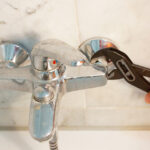Saving Money in Staff Accommodation
It is well known that throughout Dubai, many construction companies save costs by setting up staff camps for use by their employees. This benefits the employer by providing low cost, local staff accommodation that is convenient for working life.
However, some staffing camps can house more than 1,000 workers and as such the Maintenance Team will be looking for areas where costs can be saved and expenses reduced. Bills will mainly include electricity and water and if any of these utilities are not properly maintained, hundreds of thousands of Dirhams can be wasted each year.
With multiple blocks providing hundreds of rooms, canteen/kitchen facilities, toilet, shower and washing facilities, the potential for a water leak occurring is high. The problem however, with a site that size is where do you start? With such a large area to monitor, it would be difficult, if not impossible, to be aware that you have a water leak, let alone identify its location.
With the camp facilities in constant use, given that many will be shift workers, the water supply will be continuously used day and night. Management need to confidently maintain the water system as a whole and know that all the facilities are working as they should be; poorly flushing toilets, leaking taps or low pressure showers are not hygienic or appealing when returning home from a long shift.
So the question is how can you manage the site, identify issues and rectify them swiftly. Whilst a burst pipe can cause immediate costly damage, a leaking pipe that is in a wall or ceiling cavity going unnoticed for months or years could cause a wide spread amount of damage, not only to the aesthetics of the building but the internal structure, with the remedial costs being extensive.
A regular low-cost system of monitoring and inspection would assist the staff accommodation’s management in keeping costs under control. With new advanced state-of-the-art technology, a two-staged approach could be set up:
- Phase 1 – (Annual Inspections & Monitoring) would be to commence an overall level of monitoring. The equipment uses sensors to quickly identify leakage and easily offer information on the exact location of leaks even over large areas. Along with technology-based investigations looking for indications of damp or wet patches.
- Phase 2 – (In-Depth Inspections) would be a staggered, more in depth inspection which would concentrate on scanning key areas such as roof, chilled water lines, kitchens, water & drainage pipes, shower cubicles and toilet facilities. Scanning/Inspecting the building’s structures periodically would allow a problem area to be identified.
The two phased approach not only indicates if a problem is detected, but the sensors can specifically identify the location of the leak to allow a swift, low-cost repair to be carried out.
The potential benefits of this approach for operators of a typically sized staffing unit, annual savings could be as much as 500,000 AED or more in water-related operational costs alone when a full review and prevention schedule has been instigated.
Staff camps are designed to assist both employer and employee by providing affordable, clean, safe living accommodation enabling key staff to live close to their working environment. What you do not want is mouldy, stale smelling, damp rooms, creating huge financial concerns and causing unhappiness and sickness throughout the working community.
For information on how we can help if you suspect a leak, consult LeakDTech’s professionals now!




